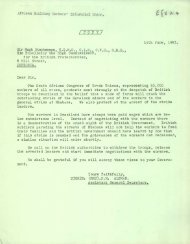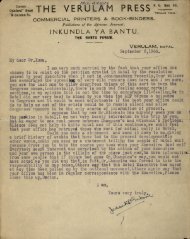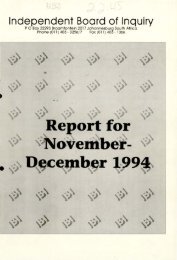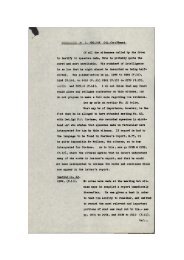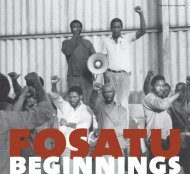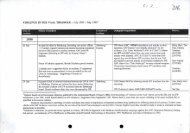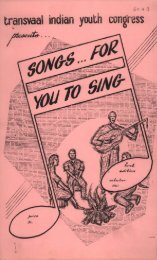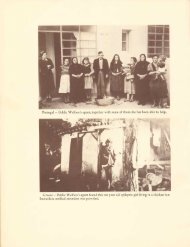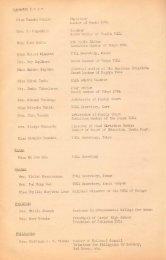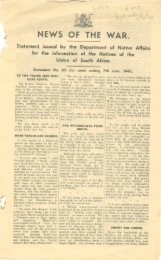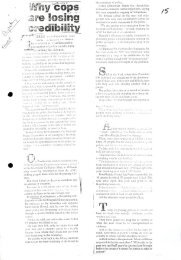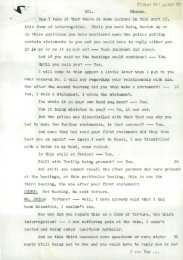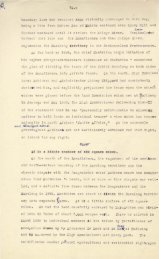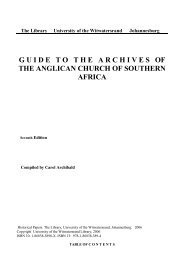A979-I1-1b-03-jpeg.pdf - Historical Papers
A979-I1-1b-03-jpeg.pdf - Historical Papers
A979-I1-1b-03-jpeg.pdf - Historical Papers
You also want an ePaper? Increase the reach of your titles
YUMPU automatically turns print PDFs into web optimized ePapers that Google loves.
KOIUSIA EA BKOOASA ASP BEOUIJASA GAZETTE, MATLHACO, SELIMOTHOI.n, » I.M*<br />
W h ite Christians<br />
'on the I »<br />
Civilised Native.<br />
The following are pawges from a<br />
to n venation Uiween ftishop IlartoJi<br />
and tbe Editor of a New York psjra-: -<br />
“ My respect for the native African<br />
incn**s every day, especially where he<br />
juu not boen cuotamiuatot with and<br />
nade worse than I n * by the crime* of<br />
white men which are incident to the<br />
introdnotion to white oiviliiation. Many<br />
■'. native law, and customs are excellent,<br />
and often (treat injustice ia don.: and<br />
K00J canscs retarded by the to 1 speedy<br />
breaking up of thf«e before something<br />
better can be maintained.<br />
“ We have three mission presses, one<br />
in each Conference and alt important,<br />
work- The tafgeat outfit ib at Monrovia,<br />
Liberia wbeire wff|»riiit the “ New<br />
Africa,” '.a * tbirfcy-two-page monthly,<br />
-Sunday school literature, and also tract*,<br />
etc., in native language* x In Angola<br />
wo aro printing a series of tracts in the<br />
Portuguese and native Kimbuudu<br />
languages; also a monthly paper, and<br />
much work has .been done in translation<br />
of hymns and Scriptures^ Tbe- press<br />
on tho East coast, at Iritianibane, ia alno<br />
doing good* The Annual -minutes for<br />
each of tho three Conferences is printed<br />
hy its own vre8s, aml the worfc is done<br />
by native black boys.”<br />
The latest humbor of the “ L. M. S.<br />
Chronicle” contains an interesting<br />
interview between Mr. .1. Gorrausof<br />
this town (now on a holiday in Cornwall)<br />
aud a representative of that<br />
journal. We culled tbe following<br />
from the account.<br />
44What have yon to say on the old<br />
question of character of native Christian*<br />
in South -Africa ? Is there any<br />
real justification for the gibes that are<br />
so often flung at ‘ Mission natives ’ ?”<br />
wThere are all sorts of Christians in<br />
Africa, aB hi -England, but, taking<br />
them as a whole, I nive .no -hesitation<br />
in saying that the native Christians arc<br />
very far from a cUagnicstQ_fcho religion<br />
thev profess. Jflanyvbf them a^o f negro's experience of the Englishman<br />
really fine character, who arfe prcpared has been varied and peculiar. The<br />
to make sacrifices both of time and English employer, when he was good,<br />
money for the a&tte of Chri&ti There was very gcwd; when • he was bad, he<br />
is something about the simplicity and was horrid. The horrid ones kicked<br />
fervour of their devotion which is very and flogged and overworked, starved,<br />
attractive; ‘indeed, I have frequently and did uot pay. The good ones paid<br />
pone to conduct service and worship well, fed well, and tended well, bu:<br />
with thein in their native chapels iu perhaps worked the negro somewhat<br />
preference to the fcurojpcan church. harder than did the more easy-going1<br />
“ Reverting to fch6 suojectof the common<br />
criticism of natives on the port of. Had any Englishman without<br />
Boer.<br />
traders and others, Mr.Gerrans declared the position of Sir Harry Johnston<br />
tliat one reason for these criticisms is<br />
said this during tlie war, he would<br />
that when the natives become Christians<br />
at once have beeu denounced as a<br />
thejf Soon begin to dtivelon their<br />
liar, a pro-Boer, aud a traitor.<br />
powers of ot^erVataoh and intelligence,<br />
and are not so easily taken by traders. — “ Truth”<br />
As a matter of fact^ ' however, tbe<br />
traders, if they only nad the ^race to<br />
eonfete it, have the best reason to be A SUGGESTION.<br />
J gratified by the progrera of Christianity,<br />
. for as soon as a native becomes a<br />
Christian he-bogins to want to improve<br />
his hotne ai^l to wear better clothing,<br />
and thbs the demand for foreign goods<br />
is greatly stimulated. In this way,<br />
British and.other manufactures reap<br />
a rich harvest through the' work of the<br />
Christian missionary.<br />
“ Moreover, I-ctnitinually have a considerable<br />
number of fjatfces in my<br />
employment, no that I have had some<br />
grounds for forming ' an opinion of<br />
native character.<br />
Of oar Unclc Mr. Gemma says :•<br />
^ Montshioa,, the former ohief of the<br />
Barolong, was in his younger days a<br />
famous rain-makcr. 1 owarda the end<br />
of his life ho became ,a Christian. He flag, which recognises uud uphold* the<br />
was a dever reader of-U)e signs/of the S t of all those who live Under its<br />
weather, and this fac% aided by a) little<br />
luck, had enabled hi’U to establish a<br />
tfftat reputation^ and when.« reputation<br />
this kind Ls onco, made it. is cmnl»rativolj<br />
easy to mai.ttaiu it.<br />
MR. P R. FRAMES.<br />
There are 'otfheS, tesidcs Mr. Leukiiane,<br />
who think with us iu our<br />
!*tanate of the senior iuotul*er for<br />
Matebelelaud. Jiu>t look on this:-<br />
whjd* baa Wen productive o f» in i> * this connection a very important point<br />
evil in America? If our native assiminH-J<br />
and act npon this mijchievow tary of State that in the opinion of the<br />
would to make it clear to the Secre<br />
doctrine, who will be to blame ? The o>U>ure*l |M>p|tf themselves and their<br />
men who use ill-considered expression* fricuds, there is not and about 1 not be<br />
u popular nte. any connection between the question of<br />
If the bloody struggle hinted at is ever the right of the dvilwed black le, and one or two of the welllknown<br />
frieuds of the coloured man aud<br />
defenders of his rights<br />
The mission chutehcsand the civilised<br />
with kindness and without scorn, and<br />
were plentifully fed. Moreover, the<br />
pay was often supplemented by the" natives of the Eastern Province may<br />
profits they were allowed to make out be trusted to act in same direction and<br />
»f agricultural pfoduoe or stock., Tho to bring these matter* and their Own<br />
especial needs before the utteution of<br />
3Ir. Chamberlain by address and deputation,,<br />
aud one cannot forbear expressing<br />
the hope that iu a matter such as<br />
this all native newspaper organs, “Imvo”<br />
and MIawfi Labantu," “ Koranta ea<br />
Bechuana,” and “ The Spectator," and<br />
all other important factors, of native<br />
opinion, will sink minor differences and<br />
work unitedly together for the common<br />
goo*.<br />
An oj»fiortunity should be affordeJ to<br />
Mr. Chamberlain t »see the dwellings,<br />
chnrclies, and scliools of the coloured<br />
people in some of sudi places as Worcester.<br />
tlie Paarl, Robertson, Ceres,<br />
Frutnche Hoek, Stellenbosdi, aud<br />
Genadendal (I am meutioniug only those<br />
comparatively near Cape Town) and to<br />
look in on aottie of the Cape Town<br />
coloured congregations. A few thouj<br />
sarvla of the coloured chil Ireu of tlie<br />
T o t h e E d i t o r o f THK“CiPKTfSina.’’ jjrarioni» denominations in Cape Town<br />
Sir,—Mar I, through your o^lumiu,' ,5“b“rt*. i*<br />
suS at to tL minister



